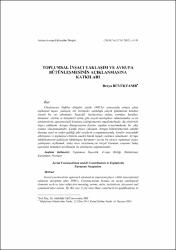| dc.contributor.author | Büyüktanır, Derya | |
| dc.date.accessioned | 2023-08-16T07:49:38Z | |
| dc.date.available | 2023-08-16T07:49:38Z | |
| dc.date.issued | 2015 | en_US |
| dc.identifier.issn | 1303-2518 | |
| dc.identifier.other | WOS:000441433700001 | |
| dc.identifier.uri | https://doi.org/10.1501/Avraras_0000000221 | |
| dc.identifier.uri | https://hdl.handle.net/20.500.12573/1718 | |
| dc.description.abstract | Uluslararası ilişkiler disiplini içinde 1980’ler sonrasında ortaya çıkan
toplumsal inşacı yaklaşım, bir önermeler topluluğu olarak günümüzde kendine
önemli bir yer edinmiştir. İnşacılık, öznelerarası anlam, normlar, kurallar,
kurumlar, söylem ve iletişimsel eylem gibi sosyal ontolojilere odaklanmakta ve bu
nitelemelerin, epistomolojik konulara indirgenmesini engellemektedir. Bu yönleriyle
inşacı yaklaşım, Avrupa Entegrasyonu üzerine yapılan araştırmalarda bir çıkış
noktası oluşturmaktadır. Çünkü inşacı yaklaşım, Avrupa bütünleşmesinin şimdiki
duruma nasıl ve neden geldiği gibi soruların cevaplanmasında, özneler arasındaki
etkileşimin ve toplumsal etkilerin analizi büyük ölçüde yardımcı olmaktadır. Avrupa
bütünleşmesini açıklayan bütünleşme kuramları yerine bu süreci, toplumsal inşacı
yaklaşımla açıklamak, daha önce incelenmeyen birçok konunun rasyonel bakış
açısından tamamen ayrılmadan ele alınmasını sağlamaktadır. | en_US |
| dc.description.abstract | Social constructivist approach attained an important place within international relations discipline after 1980's. Constructivism focuses on social ontological elements such as inter-subjective meaning, norms, rules, institutions, discourse and communicative action. By this way it prevents these constructivist qualifications to be degraded to epistemological matter and also constitutes a starting point for the researches carried out on the European integration. Because, analyzing interaction between the subjects and social impacts shall assist to find the answers of the questions how and why European integration came to the current situation, to a great extent. Explaining this process within the scope of social constructivist approach rather than the integration theory shall provide to take many issues into consideration without getting far from the rational point of view. | en_US |
| dc.language.iso | tur | en_US |
| dc.publisher | ANKARA UNIV EUROPEAN UNION RESEARCH CENTRE | en_US |
| dc.relation.isversionof | 10.1501/Avraras_0000000221 | en_US |
| dc.rights | info:eu-repo/semantics/openAccess | en_US |
| dc.subject | Toplumsal İnşacılık | en_US |
| dc.subject | Avrupa Birliği | en_US |
| dc.subject | Bütünleşme Kuramları | en_US |
| dc.subject | Normlar | en_US |
| dc.subject | Social Constructivism | en_US |
| dc.subject | The European Union | en_US |
| dc.subject | Theories of European Integration | en_US |
| dc.subject | Norms | en_US |
| dc.title | TOPLUMSAL İNŞACI YAKLAŞIM VE AVRUPA BÜTÜNLEŞMESİNİN AÇIKLANMASINA KATKILARI | en_US |
| dc.title.alternative | Social Constructivism and Its Contributions to Explain the European Integration | en_US |
| dc.type | article | en_US |
| dc.contributor.department | AGÜ, Yönetim Bilimleri Fakültesi, Ekonomi Bölümü | en_US |
| dc.contributor.institutionauthor | Büyüktanır, Derya | |
| dc.identifier.volume | 14 | en_US |
| dc.identifier.issue | 2 | en_US |
| dc.identifier.startpage | 1 | en_US |
| dc.identifier.endpage | 24 | en_US |
| dc.relation.journal | ANKARA AVRUPA CALISMALARI DERGISI-ANKARA REVIEW OF EUROPEAN STUDIES | en_US |
| dc.relation.publicationcategory | Makale - Uluslararası Hakemli Dergi - Kurum Öğretim Elemanı | en_US |


















